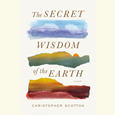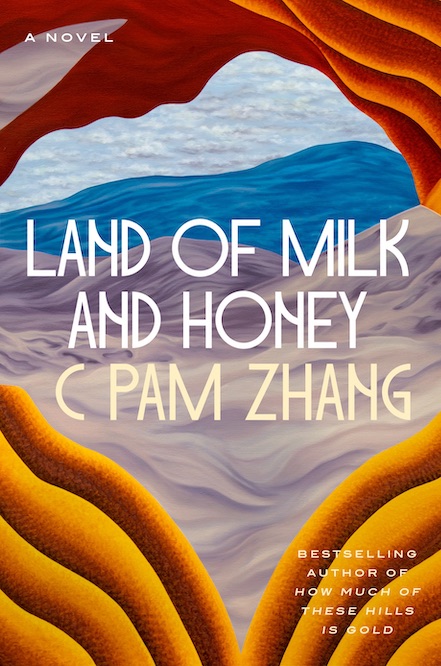Rejoice in the Complexity
In Vesper Flights, Helen Macdonald explores the interconnectedness of humans and wildlife
Captivating habitats abound in Helen Macdonald’s essay collection, Vesper Flights. Mushrooms spring up in abundance from the floor of a Suffolk forest. Harsh winds whip against the upper floors of New York’s high-rise towers, supporting — and sometimes confusing — birds flying in migration. The salt-rich deserts and volcanos of Chile’s Atacama region host a team of researchers, for whom this land stands in for the surface of Mars.
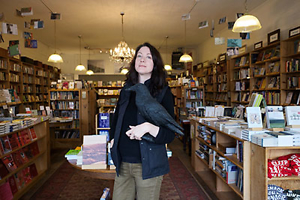
Macdonald has been pursuing the places where nature reveals its complexity and mystery since she was a tiny child. Her 2014 memoir, H Is for Hawk, details her decision, while grieving her father’s death, to train a goshawk — a species known to present brutal, violent challenges even to experienced falconers. This extraordinary exchange between human and animal changed Macdonald’s life and turned her into one of our most vital advocates for recognizing and respecting the points at which humans and wildlife interconnect.
Vesper Flights expands the scope of this advocacy, arguing that such interconnectivity is constant, often fraught, and — on occasion — sublime. Macdonald conveys such remarkable moments from her own life with sparkling originality. “Dispatches from the Valleys” recounts her years of working on a Welsh farm dedicated to falcon conservation. She describes stalking a herd of cattle and then provoking them into stampede — a cathartic act born of frustration with her own choices and a stifled sense of constraint.
The title essay compares Macdonald’s idiosyncratic methods of tricking herself into sleep with the unusual nighttime habits of swifts, who have evolved to get their sleep mid-air. Swifts emerge as memorable characters in Vesper Flights, which catalogues innumerable examples of the complicated, sometimes surreal ways in which humans and animals must attempt share the same world. Unforgettable images arise from these accounts: a gruesome YouTube clip reel of DVCs (deer-vehicle collisions); peregrine falcons living among the cooling towers of a decommissioned Irish power station; a French WWII pilot coasting, engines off, surrounded by a flock of sleeping swifts.
A number of the essays offer challenges to traditions or received beliefs within Macdonald’s own English heritage. These practices blur the concerns of wildlife with considerations of class or race. For example, Macdonald addresses the centuries-old practice of “swan upping” on the River Thames, highlighting the disparity between what’s legal for the owners of elite estates (including the royal family) and birdkeeping laws that are largely applied to lower classes.
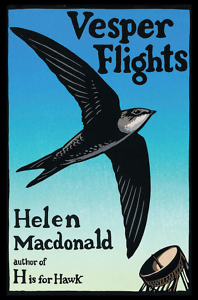 Some of the book’s most impassioned moments place the plight of refugees in the foreground. Macdonald makes clear that shutting others out — whether the sojourners are human or otherwise — comes at a great (and rapidly increasing) cost of suffering. The shadow of Brexit looms over these essays, including a short piece about an approaching summer storm, which finds Macdonald “[w]aiting for hope, stranded in that strange light that stills our hearts before the storm of history.”
Some of the book’s most impassioned moments place the plight of refugees in the foreground. Macdonald makes clear that shutting others out — whether the sojourners are human or otherwise — comes at a great (and rapidly increasing) cost of suffering. The shadow of Brexit looms over these essays, including a short piece about an approaching summer storm, which finds Macdonald “[w]aiting for hope, stranded in that strange light that stills our hearts before the storm of history.”
The destabilizing effects of climate crisis feature prominently in Vesper Flights. Losses of habit and biodiversity are disastrous for nearly every species that Macdonald describes. Yet she is not mired in despair or grief. In a brilliant essay that draws parallels between the progression of climate crisis with the experience of chronic migraines, she writes, “Apocalyptic thinking is a powerful antagonist to action.” Arguing that “apocalypse” doesn’t have to mean inevitable defeat, she continues: “In its earlier senses the word meant a revelation, a vision, an insight, an unveiling of things previously unknown, and I pray that the revelation our current apocalypse can bring is the knowledge that we have the power to intervene.”
Macdonald returns us to a truth that should be obvious to us but never is: that we humans are not always at the center of life on Earth. But our presumption of centeredness is so intractably ingrained that, in essay after essay, each time she makes this recurring point, it lands with fresh surprise. Reflecting on a life spent among wildlife, she concludes: “Animals don’t exist in order to teach us things, but that is what they have always done, and most of what they teach us is what we think we know about ourselves.”
This particular insight underscores why a book like Vesper Flights is so valuable, perhaps essential. A great strength of Macdonald’s writing is her willingness to expose her own struggle against this blind spot. She’s willing to own up. Even lifelong naturalists fall under this spell: “None of us sees animals clearly. They’re too full of the stories we’ve given them.” By seeking to undeceive herself, she helps us see our world anew.
With startling candor, precision of detail, and unsparing self-inquiry, Macdonald conveys her experiences through a lens of renewed wonderment at the rich abundance of our world and the conviction to value every species, in every habitat. Or as she phrases it: “To rejoice in the complexity of things.”
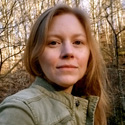
Emily Choate is the fiction editor of Peauxdunque Review and holds an M.F.A. from Sarah Lawrence College. Her fiction and nonfiction have appeared in Mississippi Review, Shenandoah, The Florida Review, Atticus Review, Tupelo Quarterly, Bayou Magazine Online, Late Night Library, and elsewhere. She lives near Nashville, where she’s working on a novel.

